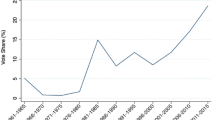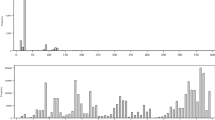Abstract
The result of the 2017 general election was widely expected to be a foregone conclusion, namely a comfortable, probably landslide, re-election for Theresa May’s Conservative Party, and an electoral disaster for Jeremy Corbyn’s Labour Party which would irrevocably prove the futility of campaigning on a radical Left-wing programme in Britain: it would be like 1983 all over again. Yet when the Exit Poll was announced at 22.00 on 8 June 2017, it was apparent that the election had produced one of the biggest shocks in British electoral history. The Conservatives had actually lost their previous narrow parliamentary majority, while the Labour Party had made significant and wholly unexpected advances. Most of the opinion polls had entirely failed to predict this outcome. This article examines Labour’s performance in one of the most astonishing British general elections ever, and explains how the Party confounded expectations, and stunned Corbyn’s many vociferous critics in the process. In so doing, it will examine the critical importance of the election campaign itself, the extent to which Labour voters prioritised different issues to their Conservative counterparts, the scale of Labour’s support not only among younger voters, but more surprisingly among professions in the AB socioeconomic category, and the way in which the Labour leader’s television and social media appearances seemed to counteract some of the negative press coverage he received.
Similar content being viewed by others
Notes
With 650 seats in the House of Common, a party technically needs to win 326 seats to secure a bare majority, but in practice, the refusal of Sinn Fein MPs to sit in the Commons (due to their refusal to take the Oath of Allegiance when MPs are ‘sworn-in’), and The Speaker's non-participation in parliamentary Divisions, means that 322 seats would probably suffice. However, such narrow majorities will assume or require that absolutely all of the governing party’s MPs support it in every parliamentary Division, otherwise the combined votes of the Opposition parties will be sufficient to inflict a narrow defeat.
While the dominant discourse has been about the expansion of the middle class and embourgeoisement and thus the increasing obsolescence of the working class, the reality seems to have been that the middle class and professions are actually undergoing a process of proletarianisation, as they are compelled to become ever more productive and profitable, and complete their tasks either more quickly, or with fewer resources—do more with less—yet without any corresponding increase in rewards and remuneration; the latter are reserved for CEOs, senior managers and shareholders.
References
Ashcroft, Lord (2017) General Election Day Poll 2017, http://lordashcroftpolls.com/wp-content/uploads/2017/06/GE-post-vote-poll-Full-tables.pdf.
Beaupierre, J. (2017) ‘Committed Tory supporter reveals why he’s abandoning “divisive” party to vote Labour’, The Daily Mirror 7 June.
Beckett, A. (2017) ‘How the Tory election machine fell apart’, The Guardiang 2 27 June.
BBC (2015) Election 2015 Results http://www.bbc.co.uk/news/election/2015/results.
BBC (2017a) Election 2017 Results http://www.bbc.co.uk/news/election/2017.
BBC (2017b) ‘General election 2017: “Why I switched from Tories to Labour”’, 10 June (http://www.bbc.co.uk/news/election-2017-40216240).
Bloodworth, J. (2015) ‘The Corbyn universe’, Progress 15 December.
Butler, D., and D. Stokes. 1974. Political Change in Britain, 2nd ed. London: Macmillan.
Chaplain, C. (2017) ‘General election 2017: Brits turning their backs on Ukip, early results show’, The Independent 9 June.
Coates, S. (2017a) ‘Tory lead grows in election’s final poll’, The Times 8 June.
Coates, S. (2017b) ‘Poll firm predicts shock losses for Theresa May’s Tories at general election’, The Times 31 May.
Cooper, C. (2015) ‘Jeremy Corbyn pressure group Momentum could “destroy” Labour party, says senior MP Caroline Flint’, The Independent 4 December.
Cortes, M. (2017) ‘ ‘There is nothing Marxist in this manifesto—so let’s defend Labour’s popular policies from the right-wing media’, LabourList 16 May (https://labourlist.org/2017/05/manuel-cortes-there-is-nothing-marxist-in-this-manifesto-so-lets-defend-labours-popular-policies-from-the-right-wing-media/).
Cowley, J. (2017) ‘The Labour reckoning’, The New Statesman 6 June.
Crace, J. (2017) ‘The making of the Maybot: a year of mindless slogans, U-turns and denials’, The Guardian G2 11 July.
Dorey, P. 2017. Towards Exit from the EU: The Conservative Party’s increasing Euro-scepticism since the 1980s. Politics and Governance 5 (2): 27–40.
Dorey, P., and A. Denham. 2016. The longest suicide vote in history: The Labour party leadership election of 2015. British Politics 11 (3): 259–282.
Dorey, P. and Denham, A. (2016b) ‘Entirely as expected? What the voting data tells us about Corbyn’s re-election’, LSE Blog—Politics and Policy, 26 September http://blogs.lse.ac.uk/politicsandpolicy/labour-2016-voting-data/).
Eaton, G. (2017) ‘Labour’s manifesto is more Keynesian than Marxist’, New Statesman 16 May. (http://www.newstatesman.com/politics/june2017/2017/05/labours-manifesto-more-keynesian-marxist).
Elliot, L. (2017) ‘Is Labour’s manifesto living in fantasy land? Quite the opposite’, The Guardian 14 May (https://www.theguardian.com/business/2017/may/14/is-labour-manifesto-fantasy-land-quite-the-opposite).
Ford, R., and M. Goodwin. 2014. Revolt on the Right: Explaining Support for the Radical Right in Britain. London: Routledge.
Goodhart, D. 2017. The Road to Somewhere: The Populist Revolt and the Future of Politics. London: Hurst.
Gramsci, A. 1971. Selections from the Prison Notebooks, edited and translated by Q. Hoare and G. Nowell-Smith. London: Lawrence & Wishart.
Guardian, The (2017) ‘Readers on why they’ve decided to vote Labour for the first time’, 1 June.
Evening Standard, The (2017) ‘Editorial: Voters need answers on Britain’s Brexit future’, 30 May.
Harrop, A. 2015. The Mountain to Climb: Labour’s 2020 Challenge, May. London: The Fabian Society.
Harrop, M. 1986. Press Coverage of Post-War British Elections. In Political Communications: The General Election Campaign of 1983, ed. I. Crewe, and M. Harrop. Cambridge: Cambridge University Press.
Hartman, T. K., Pattie, C. and Johnston, R. (2017) ‘It’s sophisticated, but can you believe YouGov’s startling election prediction?’, The Conversation 2 June.
Hatwal, A. (2017) ‘New poll analysis: Watson, Skinner and Flint facing defeat. Cooper, Miliband, Reeves and Rayner on the edge’, Labour Uncut, 20 May(http://labour-uncut.co.uk/tag/atul-hatwal/).
Heaven, W. (2017) ‘How the dementia tax—a ‘nasty party’ policy—lost Theresa May her Majority’, The Spectator 10 June.
Hunt, T. (ed.). 2016. Labour’s Identity Crisis. Winchester: Winchester University Press.
Johnston, R. and Pattie, C. (2017) ‘UKIP’s former supporters were crucial to the outcome—but not as generally expected’ in E. Thorsen, D. Jackson and D. Lilleker (eds) UK Election Analysis 2017: Media, Voters and the Campaign—Early reflections from leading academics (Bournemouth: Centre for the Study of Journalism, Culture and Community, and Centre for Politics and Media Research, Bournemouth University; The Political Studies Association) http://eprints.bournemouth.ac.uk/29374/10/UKElectionAnalysis2017_Thorsen-Jackson-and-Lilleker_v1.pdf.
Jones, P. (2017) ‘Allotments, jam and manhole covers: Jeremy Corbyn’s One Show appearance charms viewers’, Radio Times 31 May http://www.radiotimes.com/news/2017-05-31/allotments-jam-and-manhole-covers-jeremy-corbyns-one-show-appearance-charms-viewers.
Khan, M. (2017) ‘Citi predicts Conservative majority of over 100 seats’, The Financial Times 19 May.
Lawson, D. (2017) ‘There are no Tories—only Theresa’, The Sunday Times 14 May.
Liddle, R. (2017) ‘This is the worst Tory election campaign ever’, The Spectator 27 May.
Merrick, R. (2017) ‘Tories to win clear majority in general election, local election result analysis finds’, The Independent 5 May.
Negrine, R. 1989. Politics and the Mass Media in Britain. London: Routledge.
Norris, P., J. Curtice, D. Sanders, M. Scammell, and H. Semetks. 1999. On Message: Communicating the Campaign. London: Sage.
Parris, M. (2017) ‘Sneering at Corbyn does Tories no favours’, The Times 13 May
Pidd, H. and Mason, R. (2017) ‘Labour MPs critical of Corbyn fear deselection after ‘get on board’ warning’, The Guardian 7 July.
Pogrund, G. (2017) ‘Semi-skimmed socialism? No, we went full-fat far left’, The Sunday Times 18 June.
Radice, G. 1992. Southern Discomfort?, Fabian Pamphlet 555, September. London: The Fabian Society.
Riley-Smith, B. (2017) ‘Tories can win 100-seat majority, analysis from poll of polls suggests’, The Daily Telegraph 18 April.
Routledge, P. (2017) ‘In a Labour heartland I can find hardly anyone who wants to vote for them’, The Daily Mirror 19 April.
Sylvester, R. (2017) ‘Attacks on Corbyn do the Tories no favours’, The Times 30 May.
Survation (2017) ‘Labour Cut Conservative Lead to Six Points’, 30 May http://survation.com/labour-cut-conservative-lead-six-points/.
Taggart, P. and Szczerbiack, A. (2008) ‘Opposing Europe? The Politics of Euroscepticism in Europe’ in A. Szczerbiack and P. Taggart (eds) Opposing Europe: The Comparative Party Politics of Euroscepticism, Volume 1 (Oxford: Oxford University Press).
Turner, J. (2017) ‘ Whatever the election result, Labour loses’, The Times 22 April.
Watson, T. (2016) ‘Far left entryists could destroy our party’, LabourList 9 August http://labourlist.org/2016/08/tom-watson-far-left-entryists-could-destroy-our-party/.
Whyatt, P. (2017) ‘Why the Conservatives lost Derby North seat to Labour’s Chris Williamson’, The Derby Telegraph 9 June.
YouGov (2015) General election 2015: how Britain really voted, 8 June 2015 https://d25d2506sfb94s.cloudfront.net/cumulus_uploads/document/owc2a5orpr/Establishment_Extra_Variables_Website.pdf.
YouGov (2017) How Britain voted at the 2017 general election, 13 June https://d25d2506sfb94s.cloudfront.net/cumulus_uploads/document/smo1w49ph1/InternalResults_170613_2017Election_Demographics_W.pdf.
Zarb-Cousin, M. (2017a) ‘Labour is surging in the polls – and it’s all because the media is finally giving Jeremy Corbyn impartial coverage’, The Independent 22 May.
Zarb-Cousin, M. (2017b) ‘How Jeremy Corbyn managed to bring UKIP voters back to Labour’, The Guardian 13 June.
Author information
Authors and Affiliations
Corresponding author
Rights and permissions
About this article
Cite this article
Dorey, P. Jeremy Corbyn confounds his critics: explaining the Labour party’s remarkable resurgence in the 2017 election. Br Polit 12, 308–334 (2017). https://doi.org/10.1057/s41293-017-0058-4
Published:
Issue Date:
DOI: https://doi.org/10.1057/s41293-017-0058-4




